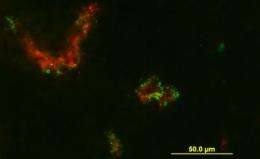Researchers shrink tumors, minimize side effects using tumor-homing peptide to deliver treatment

The trouble with most anti-cancer therapies is that they are lethal to most cells in the body, not just cancer cells. As a result, patients experience side effects like nausea, increased susceptibility to infection, and increased risk of developing secondary cancers later in life. Researchers at Sanford-Burnham Medical Research Institute (Sanford-Burnham) are developing techniques to deliver cancer drugs directly to tumors, increasing their effectiveness and decreasing collateral damage.
In a study published the week of November 21 in the Proceedings of the National Academy of Sciences, a team led by Michiko Fukuda, Ph.D. coupled a cancer drug to a small protein called IF7, which is specifically attracted to the blood vessels that feed tumors. When administered in a mouse model of human colon cancer, IF7 carried the drug directly to tumors, where it suppressed growth at low dosages and with no apparent side effects. These findings suggest that IF7 is an efficient drug delivery vehicle that could be further exploited to target a variety of anti-cancer therapeutics where they're needed most, without harming other tissues.
"We can cure terminal stage mice with very large tumors without any side effects simply by giving them this drug coupled with IF7," said Dr. Fukuda, professor in Sanford-Burnham's National Cancer Institute (NCI)-designated Cancer Center and corresponding author of the study.
Carbohydrates coat the surface of every cell in the body. They—and the proteins that bind them—play important roles in many cellular processes, including tumor formation and cancer metastasis. However, unlike genes or proteins, carbohydrates are difficult to synthesize in the lab. To get around that hurdle, Dr. Fukuda and her team tested a collection of short proteins (called peptides) in the hopes of finding some that can mimic carbohydrates and inhibit carbohydrate-dependent metastasis. IF7 was one of the "winning" peptides. Upon further investigation, Dr. Fukuda's team found that IF7 works because it binds annexin 1, a carbohydrate-binding protein that is found in particularly high levels on the surfaces of blood vessels that feed tumors.
In this study, the researchers coupled IF7 with a fluorescent probe and administered it to mice bearing human colon tumors. They watched as, within minutes, the probe lit up the tumors. Next, they coupled IF7 with SN-38, a potent anti-cancer drug. They also engineered the tumors to glow, so they could measure them after daily injections with IF7/SN-38. Tumors in treated mice shrank dramatically while tumor size in mock-treated mice was unchanged. It's worth noting that the amount of SN-38 the mice received in this study was only one-seventh the amount a previous study used to treat tumors in mice. Perhaps for that reason, blood tests showed no signs of side effects in IF7/SN-38-treated mice.
"Although we tested colon tumors in this study, theoretically any tumor that induces expression of annexin 1 in blood vessels would work with this system—it just depends on what kind of drug it's paired with," said Minoru Fukuda, Ph.D., professor in Sanford-Burnham's National Cancer Institute (NCI)-designated Cancer Center and co-author of the study.
Given its extremely specific tumor-targeting activity, the authors conclude that IF7 may represent a clinically relevant vehicle for anti-cancer drugs. Next, they hope to further prepare this technology for clinical trials in humans.













